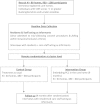Improving Well-being and Health for People with Dementia (WHELD): study protocol for a randomised controlled trial
- PMID: 25016303
- PMCID: PMC4227075
- DOI: 10.1186/1745-6215-15-284
Improving Well-being and Health for People with Dementia (WHELD): study protocol for a randomised controlled trial
Abstract
Background: People with dementia living in care homes often have complex mental health problems, disabilities and social needs. Providing more comprehensive training for staff working in care home environments is a high national priority. It is important that this training is evidence based and delivers improvement for people with dementia residing in these environments. Well-being and Health for People with Dementia (WHELD) combines the most effective elements of existing approaches to develop a comprehensive but practical staff training intervention. This optimised intervention is based on a factorial study and qualitative evaluation, to combine: training on person-centred care, promoting person-centred activities and interactions, and providing care home staff and general practitioners with updated knowledge regarding the optimal use of psychotropic medications for persons with dementia in care homes.
Design: The trial will be a randomised controlled two-arm cluster single blind trial that will take place for nine months across 80 care homes in the United Kingdom.
Discussion: The overarching goal of this trial is to determine whether this optimised WHELD intervention is more effective in improving the quality of life and mental health than the usual care provided to people with dementia living in nursing homes. This study will be the largest and best powered randomised controlled trial (RCT) evaluating the benefits of an augmented person-centred care training intervention in care homes worldwide.
Trial registration: Current controlled trials ISRCTN62237498 Date registered: 5 September 2013.
Figures
Similar articles
-
Feasibility study of an optimised person-centred intervention to improve mental health and reduce antipsychotics amongst people with dementia in care homes: study protocol for a randomised controlled trial.Trials. 2013 Jan 10;14:13. doi: 10.1186/1745-6215-14-13. Trials. 2013. PMID: 23305152 Free PMC article. Clinical Trial.
-
Impact of person-centred care training and person-centred activities on quality of life, agitation, and antipsychotic use in people with dementia living in nursing homes: A cluster-randomised controlled trial.PLoS Med. 2018 Feb 6;15(2):e1002500. doi: 10.1371/journal.pmed.1002500. eCollection 2018 Feb. PLoS Med. 2018. PMID: 29408901 Free PMC article. Clinical Trial.
-
Improving mental health and reducing antipsychotic use in people with dementia in care homes: the WHELD research programme including two RCTs.Southampton (UK): NIHR Journals Library; 2020 Jul. Southampton (UK): NIHR Journals Library; 2020 Jul. PMID: 32721145 Free Books & Documents. Review.
-
A group intervention to improve quality of life for people with advanced dementia living in care homes: the Namaste feasibility cluster RCT.Health Technol Assess. 2020 Jan;24(6):1-140. doi: 10.3310/hta24060. Health Technol Assess. 2020. PMID: 31971506 Free PMC article. Clinical Trial.
-
Challenge Demcare: management of challenging behaviour in dementia at home and in care homes – development, evaluation and implementation of an online individualised intervention for care homes; and a cohort study of specialist community mental health care for families.Southampton (UK): NIHR Journals Library; 2017 Aug. Southampton (UK): NIHR Journals Library; 2017 Aug. PMID: 28783270 Free Books & Documents. Review.
Cited by
-
COSMOS--improving the quality of life in nursing home patients: protocol for an effectiveness-implementation cluster randomized clinical hybrid trial.Implement Sci. 2015 Sep 15;10:131. doi: 10.1186/s13012-015-0310-5. Implement Sci. 2015. PMID: 26374231 Free PMC article. Clinical Trial.
-
Dealing with behavioral and psychological symptoms of dementia: a general overview.Psychol Res Behav Manag. 2015 Jul 3;8:181-5. doi: 10.2147/PRBM.S44775. eCollection 2015. Psychol Res Behav Manag. 2015. PMID: 26170729 Free PMC article. Review.
-
Advance Care Planning in Nursing Homes - Improving the Communication Among Patient, Family, and Staff: Results From a Cluster Randomized Controlled Trial (COSMOS).Front Psychol. 2018 Dec 4;9:2284. doi: 10.3389/fpsyg.2018.02284. eCollection 2018. Front Psychol. 2018. PMID: 30564163 Free PMC article.
-
Non-benzodiazepine hypnotic use for sleep disturbance in people aged over 55 years living with dementia: a series of cohort studies.Health Technol Assess. 2021 Jan;25(1):1-202. doi: 10.3310/hta25010. Health Technol Assess. 2021. PMID: 33410736 Free PMC article.
-
Psychosocial interventions for reducing antipsychotic medication in care home residents.Cochrane Database Syst Rev. 2023 Aug 31;8(8):CD008634. doi: 10.1002/14651858.CD008634.pub3. Cochrane Database Syst Rev. 2023. PMID: 37650479 Free PMC article.
References
-
- Knapp M, Prince M, Albanese E, Banerjee S, Dhanasiri S, Fernandez J-L, Ferri C, McCrone P, Snell T, Stewart R. Dementia UK. London: Alzheimer’s Society; 2007.
-
- Ballard CG, Gauthier S, Cummings JL, Brodaty H, Grossberg GT, Robert P, Lyketsos CG. Management of agitation and aggression associated with Alzheimer disease. Nat Rev Neurol. 2009;5(5):245–255. - PubMed
-
- Corbett A, Smith J, Creese B, Ballard C. Treatment of behavioral and psychological symptoms of Alzheimer’s disease. Curr Treat Options Neurol. 2012;14(2):113–125. - PubMed
-
- Fossey J, Masson S, Stafford J, Lawrence V, Corbett A, Ballard C. The disconnect between evidence and practice: a systematic review of person-centred interventions and training manuals for care home staff working with people with dementia. Int J Psychiatr. 2014. - PubMed
-
- Testad I, Corbett A, Aarsland D, Lexow KO, Fossey J, Woods B, Ballard C. The value of personalized psychosocial interventions to address behavioral and psychological symptoms in people with dementia living in care home settings: a systematic review. Int Psychogeriatr. 2014;24:1–16. - PubMed
Publication types
MeSH terms
Substances
Associated data
Grants and funding
LinkOut - more resources
Full Text Sources
Other Literature Sources
Medical



